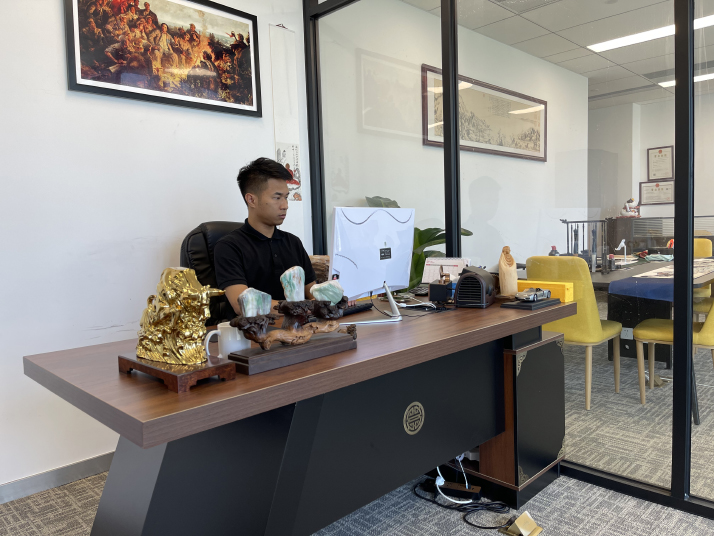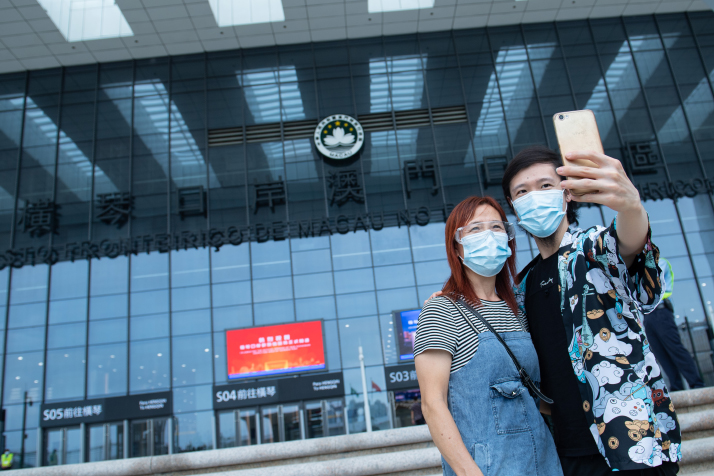| China |
| Hengqin initiative pumps up Macao's development prospects | |
|
|
 Leong Ka-seng at his office in Hengqin on September 15 (COURTESY PHOTO)
Before graduating from the University of International Business and Economics in Beijing in 2015, Leong Ka-seng, a Macao entrepreneur, visited Hengqin Island in Guangdong Province to look for career development prospects. He finally secured a job at a company there. "My father, who later moved to Macao, participated in government-led land reclamation projects in Hengqin more than 40 years ago, along with other family members," Leong told Beijing Review. "This is why I chose the place as the starting point of my new life after graduation, following in the footsteps of my predecessors." Hengqin is nestled in the southern part of Zhuhai, right across the water from Macao Special Administrative Region (SAR). Development of the 106-square-km island, three times the SAR's size, is expected to create great opportunities for Macao's prosperity. These expectations have been further reinforced following the central authorities' most recent plan for the establishment of a Guangdong-Macao in-depth cooperation zone. "Hengqin is a good platform for Macao's young adults to engage in the development of the Guangdong-Hong Kong-Macao Greater Bay Area and the broader mainland," Leong said. Development of the bay area, consisting of nine cities in Guangdong and Hong Kong and Macao SARs is a national strategy of China.  Passengers pose for pictures at a checkpoint connecting Macao with Hengqin in Zhuhai, Guangdong Province, on August 18, 2020 (XINHUA)
New undertakings "Macao is embracing new and major development opportunities," Tong Kai Chung, President of the Macao Institute of Management, told Beijing Review. Macao's industrial structure is relatively straightforward with tourism and gaming-related industries serving as its principal parts, according to Tong. In 2003, the central authorities launched an Individual Visit Scheme, relaxing previous restrictions on mainlanders' travel to Macao. Complemented by additional measures, Macao's economy has since received a strong boost. However, a reliance on single industries comes with risks and the COVID-19 pandemic since 2020 has highlighted its vulnerabilities. Moreover, Macao's shortage of land resources and small market further confine the SAR's development, Tong added. Consequently, the question beckons: What kinds of industries would the Hengqin area prefer? Ho Iat-seng, Chief Executive of Macao SAR, said at a press conference on September 10 that the gaming industry would not be allowed into the cooperation zone in accordance with the related mainland laws. Similarly, according to Time Finance, a Guangdong-based new media platform, the area is no place for real estate development. The central authorities have positioned several indicative guidelines such as leveraging Hengqin's advantages in industries like technological research and development, high-end manufacturing, cultural tourism, trade and finance. The cooperation zone aims to help Macao nurture a more diversified economy. "I hope it will focus on real economy and promising industries," Leong said. "It's important to develop some good, solid enterprises here." Preferential tax policies will be implemented in the cooperation zone, the new plan read. For example, all industries beneficial to Macao's diversified economic development are entitled to the preferential corporate income tax rate of 15 percent, a number significantly below the general 25 percent. What's more, high-caliber professionals employed in the zone can enjoy a 15-percent cap on personal income tax, compared with the current maximum rate of 45 percent for the highest earners on the mainland. "The zone is expected to help attract investment, enterprises and talents from Belt and Road participants plus the Portuguese-speaking region," Tong said, adding that their participation will improve the industrial structure of Macao and inject new impetus into the SAR's growth in the post-epidemic period. Growing together After working in his first job for two years, Leong decided to launch his own business in interior decorating in 2017. "The two-year working experience allowed me to really understand the potential of Hengqin," he explained. With many Macao residents moving to Hengqin, their decorative requirements usually differ from the styles found on the mainland. Leong moved to Hengqin in 2018 to up his hands-on business approach. Previously, his daily routine included a one-hour commute to and from work. As a matter of fact, allowing a greater number of Macao-registered vehicles into Hengqin is one of the concrete steps stemming from the supportive measures promoted by the Central Government to boost the development prospects of Macao and Guangdong-Macao cooperation. The number of Macao-registered vehicles allowed to enter Hengqin has been expanded in a phased manner, from 400 at the introduction of the scheme in 2016, to 10,000 this year. "Those 10,000 still cannot cover the increasing movement into the area. Luckily, the plan has made several arrangements in terms of personnel and data flows, including the simplification of customs procedures and an increased convenience for Macao-registered vehicles entering and exiting Hengqin," Leong said. In Macao, renting a 30-square-meter bay-side apartment will cost roughly 10,000 Macao pataca ($1,248), whereas in Hengqin, residents can rent a three-bedroom apartment for a mere 4,000 yuan ($620), according to Leong. Hengqin is rapidly evolving into a new residential option for Macao's populace. "Since last year, I have seen more and more Macao residents move here; living here and working in Macao," Leong said. At this point, Leong's business has expanded well beyond the realm of interior decorating, tapping into property consultancy, the restaurant industry and social media. As people considering a move to Hengqin might be unfamiliar with a number of procedures, such as how to apply for the related qualifications, Leong and his friends decided to do something. "We started recording videos and posting them on social media, sharing with viewers our tips and tricks on how to start your business, or life, in Hengqin," Leong said. Six years ago, when Leong first arrived in Hengqin, it looked like a construction site. Today, it looks, and feels, completely different. "The infrastructure facilities have been fully furnished," Leong explained. "The design of the zone showcases the vitality of the 'one country, two systems' policy," Tong added. "The next step requires us to issue specific supporting measures which require the collaboration and knowledge of both the Guangdong and Macao governments." Many Macao residents believe Hengqin still needs some 10 years of development before it can grow into a mature economy. "My point is that it changes every day, so why not seize the opportunity and move forward together with Hengqin?" Leong concluded. (Printed Edition Title: Across the Water) Copyedited by Elsbeth van Paridon Comments to taoxing@bjreview.com |
|
||||||||||||||||||||||||||||
|
